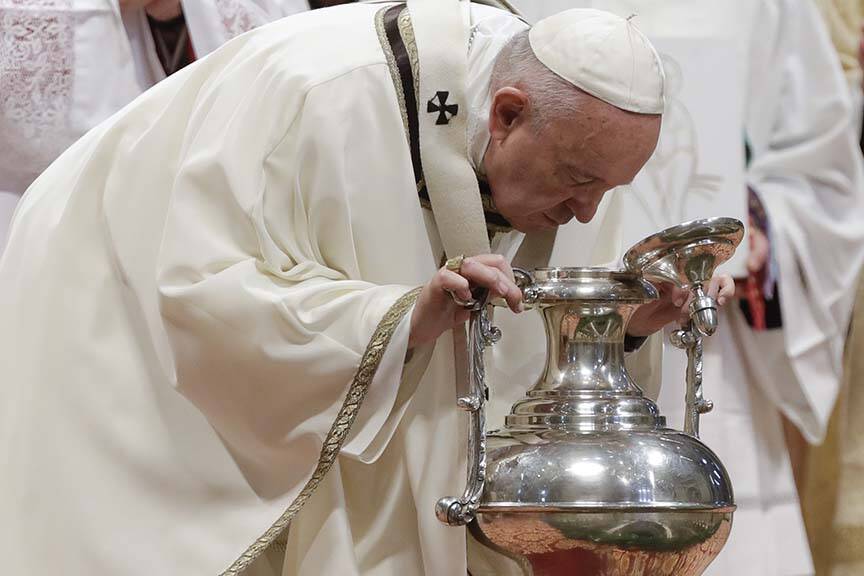CLARENCE PAGE: Pope Francis believes the world needs to laugh more
As an experienced class clown who long has felt the power of comedy to be vastly underappreciated, I was more than tickled to hear that Pope Francis had invited more than 100 comedians to an audience at the Vatican.
Blessed are the mirth makers, I thought — along with, does he know what he’s doing?
The guests included such big-name comics as Stephen Colbert, Whoopi Goldberg, Chris Rock, Jimmy Fallon, Conan O’Brien, Jim Gaffigan, Julia Louis-Dreyfus, Tig Notaro, Mike Birbiglia, Kathleen Madigan and David Sedaris.
It turns out that Pope Francis also is a big believer in the power of comedy and has praised its power to help bring about a more empathetic and sympathetic world.
Irony is a central element in humor, he noted in a separate meeting with artists in the Sistine Chapel last year, where he praised their ability “to dream up new versions of the world,” and often do so “with irony, which is a wonderful virtue.”
In this latest session with comedians, he went one further and reassured them that God likes a good joke, even at his own expense. The pope told the comics they need not be concerned about being too irreverent, always a fear among those paid to make us laugh.
“You can laugh at God … that’s not blasphemy,” he said. “When you manage to bring intelligent smiles to the lips of even a single spectator, you also make God smile.”
Indeed, I agreed as I read his translated remarks. I also found myself wondering wistfully what George Carlin would think of this gathering. Carlin, who died in 2008, was a comic superstar dubbed “the dean of counterculture comedians” when he rose to prominence in the 1960s.
He ridiculed all sorts of conventions, including religion and politics, often with unflinching jabs that singed and often burned.
“I used to be an Irish Catholic,” he said in one of the milder lines on his bestselling “Class Clown” album. “Now I’m an American. Y’know, you grow.”
Carlin was so controversial that one of his routines was the subject of a 1978 Supreme Court decision. His memorable “Seven Words You Can Never Say on Television” (or in a family newspaper, I must say) wouldn’t raise much of a stir today, but in the 1970s the bit rattled a lot of cages — as it was meant to do.
No shock of that sort rattled the good feelings of the pope’s encounter with the comics, where he praised their ability to bring people together by helping us to laugh at ourselves.
“In the midst of so much gloomy news,” Francis told the comedians, “you denounce abuses of power, you give voice to forgotten situations, you highlight abuses, you point out inappropriate behavior.” He also praised their ability to get people to “think critically by making them laugh and smile.”
That’s what I like about comedy, too.
Of course, there are critics of the Catholic Church who don’t think entertainers ought to be visiting with the head of an institution they think is homophobic and sexist, and that’s for starters. That’s a different type of critical thinking, and surely we must respect those who turn down the chance to meet with the pope for such reasons.
But, if nothing else, Francis’ meeting reminded us of a prayer credited to St. Thomas More, who surely didn’t find it at all humorous when Henry VIII had him beheaded. The “Prayer for Good Humor,” attributed to More, was something the pope said he prayed regularly for 40 years.
“Do you know that prayer? You should know it,” he told the comedians.
I looked it up and I agree that it contains wisdom that should be widely shared and remembered.
In short, it begins with,
“Grant me, O Lord, good digestion, and also something to digest. Grant me a healthy body, and the necessary good humor to maintain it.”
And it ends with:
“Grant me, O Lord, a sense of good humor.
“Allow me the grace to be able to take a joke to discover in life a bit of joy,and to be able to share it with others.”
Amen.
Contact Clarence Page at cpage@chicagotribune.com.

















